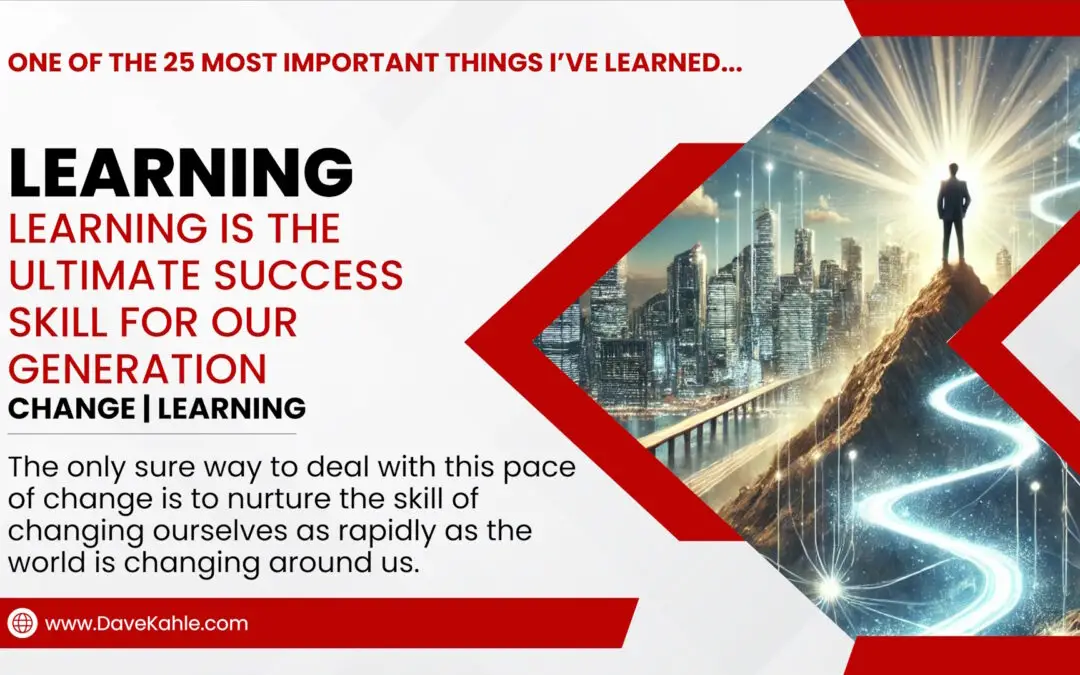Some time ago, one of my clients challenged me to record the 20 most important lessons I’ve learned. After a great deal of reflection, I eventually came up with 25. This is one.
The pace of change has increased, the growth in complexity has multiplied, and information has proliferated at an unprecedented pace. We are in extraordinary times. And unprecedented times call for unique and disciplined approaches if we are to survive and thrive.
The only sure way to deal with this pace of change is to nurture the skill of changing ourselves as rapidly as the world is changing around us. And that makes learning the ultimate success skill for our generation.
Definitions
When most of us hear the word “learning” we often associate it with formal school, or perhaps seminars and company-sponsored training programs. While these are all means of facilitating learning, they don’t capture the essence of what I’m talking about.
The kind of teaching/learning that is done in academia revolves around the transfer of information. The focus is on what you know, and the measurement is the score on an exam.
For adults, on the job, the focus is different. Here it is all about behavior change. I often tell salespeople in my seminars “I don’t care what you know. You are not paid for what you know. You are paid for what you do.”
Learning is the ability, on the part of the individual, or the organization, to absorb new information about the world or oneself, and to change one’s behavior in positive ways in response to it. The key is behavior change. Learning without action is impotent. Knowledge that doesn’t result in changed action is of little value.
****************************************************************************************************
The key is behavior change. Learning without action is impotent. Knowledge that doesn’t result in changed action is of little value.
****************************************************************************************************
Let’s say, for example, that you invest in a new software program. You bring in the trainers and dedicate time to training your staff on the new program. The trainer gives a final exam, and everyone passes with 100%. The next day, no one uses the new software. They learned it intellectually, but never made the leap to changed behavior. For adults, on the job, knowledge that doesn’t result in changed action is worthless.
So, changed behavior is synonymous with learning. Whenever we speak of learning, we are talking about changing behavior.
This kind of learning, which I call Professional Learning, manifests itself as both a personal discipline, as well as a strategic piece of an organization’s culture.
Professional describes both the mind-set of the learners and the approach to the challenge. It’s like golf. Everyone can golf just like everyone can learn. Eventually the ball will go into the hole.
However, if you were going to make your living at golf, you would take on a whole different approach. You would seriously devote time, energy and money to the process of improving your golf game. Rather than being an occasional event, golf would become a key focus in your life. You’d invest in the best clubs, hire the best coaches, practice regularly, and create the necessary disciplines and habits. Improving your golf game would be a necessary avenue to financial survival and success.
So, it is with learning in our frenetic world. Like golf, one can do it occasionally, or decide to be a professional. A Professional Learner understands that learning is the key to survival and success. He/she decides to make it a key focus in life, investing time, money and energy in the routines, habits and tools that will enable greater and more rapid learning.
A professional golfer engages with some aspect of the game every day. So, too, a professional learner is occupied with the attitudes, disciplines and tools of learning.
This kind of learning is intentional.
Intentional means that the learner, or the learning organization, decides to learn. It doesn’t happen by osmosis. Just like one doesn’t accidently become a tournament level golfer, so too one doesn’t unconsciously stumble into becoming a Professional Learner. It is easy to understand the decision to learn a specific skill – say a new software program – as something that circumstances require occasionally. Occasional requirements to keep up with company dictates is not what I’m talking about.
That’s a watered-down version of the kind of commitment to which I’m referring. This kind of commitment is to a lifetime of continuous growth. The intentional learner understands that the need to continually learn is the ultimate skill for success and survival in our hyper-frenetic age. So, he/she makes an intentional commitment to the life-long pursuit of continuous growth, deciding to build in habits, attitudes and skills that will enable continuous and life-long behavior change.
This kind of learning is pro-active. It’s one thing to react to an employer’s requirement to learn a new software program, and it’s quite another to decide to develop the skill necessary for a potential promotion. The pro-active learner narrows in on a goal to be accomplished or an interest to be developed and takes the steps to acquire the skills and competencies necessary.
Just like professional golfers are continuously focusing on one aspect of the game at a time, so Professional Learners keep a list of things to be learned. The list is dynamic, continuously evolving. Items on the list come from multiple sources: introspection, goal setting, and the stimulant of regularly engaging with new information.
In a world that is changing as rapidly as ours is, the ability of every individual to learn and grow, at least as rapidly as the world is changing around us, is the fundamental skill we must master if we are going to survive and prosper in these turbulent times.
And that’s why it is one of the 25 most important lessons I’ve learned.
Related Resources



